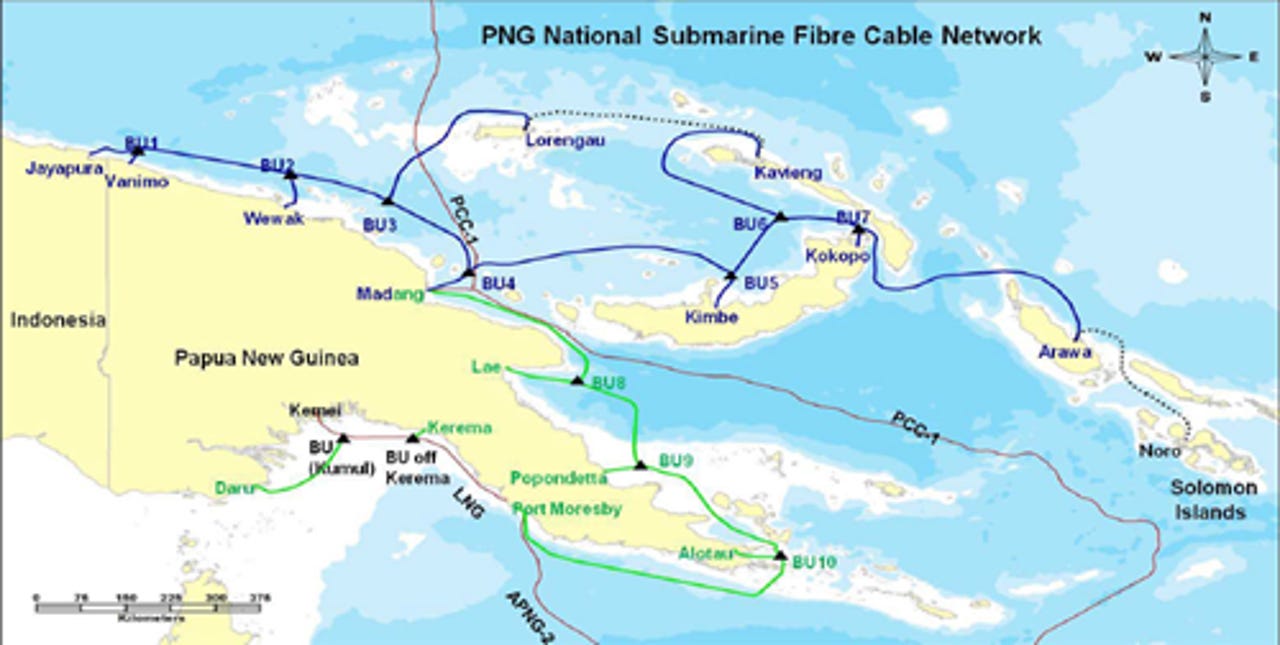PNG sticks with Huawei for subsea cable: Report


Huawei will continue building out a submarine cable network interconnecting Papua New Guinea despite pressure from Australia, the United States, and Japan, according to a report by Reuters.
The report said PNG's Public Enterprise and State Investment Minister William Duma told Reuters that the nation had "an existing agreement" with Huawei.
"It's about honour and integrity; once you enter into a deal and an arrangement, you go with it," Duma reportedly told Reuters, adding that Huawei has already completed around 60 percent of the project.
"It's a bit patronising", he reportedly added in relation to counter-offers allegedly being pushed by Australia, Japan, and the US.
Huawei Marine had in October 2016 announced that it would be helping PNG build out an 8Tbps, 5,457km national submarine broadband cable network alongside the government's telco PNG DataCo across 14 main cities and population centres, along with a link to Jayapura, Indonesia.
Earlier this year, the Australian government had used AU$200 million in foreign aid to lock Huawei out of supplying a subsea cable connecting Papua New Guinea and the Solomon Islands with Australia.
Vocus was subsequently awarded the AU$137 million contract by the Australian government to construct the cable.
"Awarding the AU$136.6 million contract to delivery partner Vocus is a major milestone and signals the start of the physical installation of the Coral Sea Cable System," former Minister for Foreign Affairs Julie Bishop said in June.
"Australia will deliver and majority-fund the cables, with financial co-contribution from both PNG and Solomon Islands."
Vocus said the Coral Sea Cable System, which is expected to be complete by the end of next year, will use multi-terabit technology. It will now commence a "comprehensive program of survey, manufacture, and deployment activities", the company added.
The telco is also set to build out a domestic submarine cable network in the Solomon Islands to link Auki in the Malaita Province, Noro in the Western Province, and Taro in the Choiseul Province with the Honiara landing point, which will be jointly funded by Australia and the Solomon Islands.
Former Australian Prime Minister Malcolm Turnbull had in April confirmed the subsea cable would be built, saying that the federal government would provide the "majority" of the funding for the project, which will also land in Port Moresby.
During the week of political turmoil that saw Turnbull and Bishop step down from their roles, and Scott Morrison installed as Prime Minister of Australia, Huawei was then banned from participating in any 5G deployments across the nation due to supposed national security issues stemming from concerns of foreign government interference in critical communications infrastructure.
US President Donald Trump has also been cracking down on Chinese involvement in the American tech sphere, including through draft legislation barring the sale of national security-sensitive technology to China, and blocking government or contractors from buying telecommunications equipment and services from Huawei and ZTE.
Huawei in July told the Federal Communications Commission (FCC) that the US should not miss out on its world-leading technology, pointing out that its exclusion would drive up consumer costs.
United States Senators Marco Rubio and Mark Warner then reportedly told Canadian Prime Minister Justin Trudeau to ban Huawei from taking part in its 5G networks.
Huawei in September denied similar reports that the Indian government had excluded it from taking part in joint 5G trials, saying it is currently proposing a set of solutions to support the government's requirements for a nationwide 5G rollout.
South Korea's largest carrier left Huawei off its list of 5G vendors, with SK Telecom announcing in September that it would be going with Ericsson, Nokia, and Samsung.
Huawei is still actively participating in 5G across the United Kingdom and New Zealand, however.
Related Coverage
- Quick glossary: 5G technology
- Huawei and Spark showcase separated 5G network in New Zealand
- Huawei and Three UK trial 5G home broadband
- Huawei unveils artificial intelligence smart cities platform
- Huawei denies foreign network hack reports
- 5G mobile edge tests completed by global tech giants
- Huawei surpasses Apple in Q2 smartphone shipments (TechRepublic)
- Huawei developing own mobile OS in case it gets banned from using Android (TechRepublic)